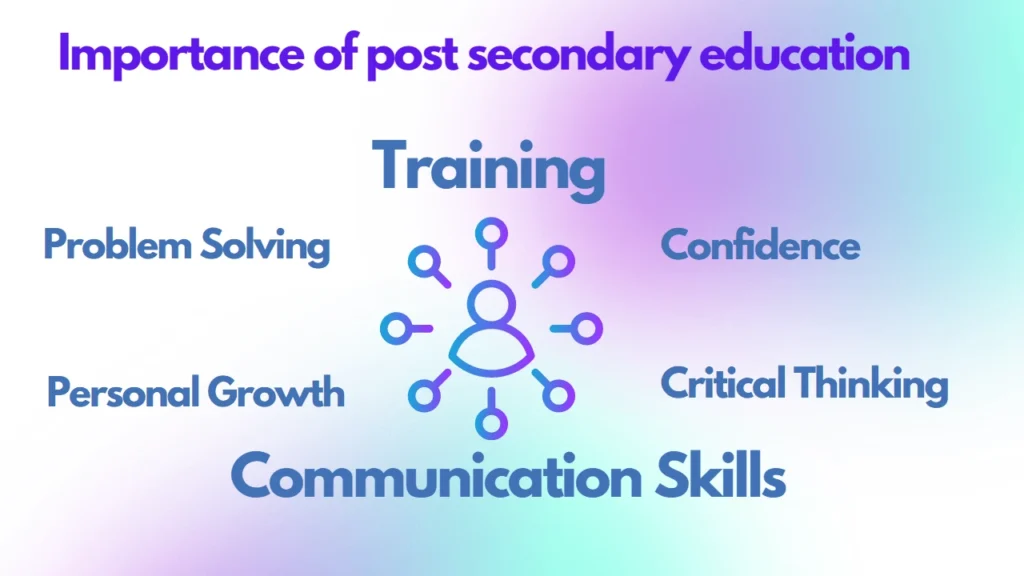What is post secondary education?
Post-secondary education refers to education beyond the high school level. This can include college, university, and vocational or technical training programs. Post-secondary education can be either formal or informal, and it can take place at institutions such as community colleges, universities, trade schools, and vocational schools.
Post-secondary education is often seen as a way to further one’s education and career opportunities. Many post-secondary programs offer specialized training in a particular field, such as business, engineering, or healthcare, and can lead to a certificate, diploma, or degree.
Post-secondary education is not required for all careers, but it can be beneficial for those seeking advanced knowledge and skills in their field or for those looking to enter a competitive job market. In many cases, post-secondary education can also lead to higher earning potential and better job prospects.
Table of Contents

Meaning of Post Secondary Education
Post-secondary education refers to education beyond high school, including college, university, and vocational training programs. It can lead to a certificate, diploma, or degree and offer specialized training in a particular field. Post-secondary education can be beneficial for those seeking advanced knowledge and skills and those looking to enter a competitive job market.
Importance of Post Secondary Education
Post Secondary Education helps ones to upgrade their skills so that he/she can adjust in the market. It can provide students with specialized training and knowledge in a particular field, improve job prospects and earning potential, and offer opportunities for personal growth and networking. Some importance of post secondary education is given below.
1. Specialized training and knowledge
Post-secondary education can provide students with specialized training and knowledge in a particular field, helping them develop the skills and expertise needed for a specific career. For example, a student who completes a degree in engineering will have a strong foundation in the principles of engineering and be well-prepared to enter the field. Similarly, a student who completes a nursing program will have the knowledge and skills needed to work as a nurse. Specialized training and knowledge can be especially valuable in fields that require advanced skills or specialized knowledge, such as healthcare, engineering, or computer science.
2. Improved job prospects
Many employers prefer to hire candidates with post-secondary education, and post-secondary graduates often have better job prospects and higher earning potential. This is especially true in fields that require advanced skills or knowledge, such as those mentioned above. In addition, post-secondary education can demonstrate to employers that a candidate is committed to their career and has a strong work ethic. Even in fields that do not require post-secondary education, having a degree or other advanced training can still be beneficial, as it can set candidates apart from other job seekers and make them more competitive in the job market.
3. Opportunity for personal growth
Post-secondary education can provide students with the opportunity to explore their interests, develop new skills, and learn about different cultures and ways of thinking. For many students, post-secondary education is a time to discover their passions and explore new interests. Whether through coursework, extracurricular activities, or personal exploration, post-secondary education can provide students with a wealth of opportunities for personal growth.
4. Networking opportunities
Post-secondary education can provide students with opportunities to network with professionals in their field and build connections that can lead to future job opportunities. Many post-secondary programs offer internships, co-op programs, or other experiential learning opportunities that allow students to gain hands-on experience and make connections in their field. In addition, post-secondary programs often have strong alumni networks that can provide valuable networking opportunities for graduates.
5. Increased critical thinking skills
Post-secondary education can help students develop critical thinking skills, which can be useful in both their personal and professional lives. Critical thinking involves the ability to analyze and evaluate information, arguments, and evidence in order to make informed decisions. It is a valuable skill in any field, as it helps individuals make well-informed and logical decisions. Post-secondary education can help students develop critical thinking skills through coursework, discussions, and other learning activities that encourage analysis and evaluation.

Popular Reading >> Components of Iway
6. Greater independence
Post-secondary education can help students develop independence and self-reliance as they learn to manage their time, finances, and responsibilities. For many students, post-secondary education is their first experience living away from home and managing their own affairs. This can be a challenge, but it can also be an incredibly rewarding experience as students learn to take responsibility for their own lives and become more self-sufficient. Post-secondary education can provide students with the opportunity to make their own decisions, solve problems on their own, and develop their own independence.
7. Improved communication skills
Many post-secondary programs place a strong emphasis on communication skills, which can be valuable in both personal and professional settings. Communication skills include the ability to speak and write clearly and effectively, as well as listen actively and comprehend what others are saying. These skills are essential for success in any field, as they enable individuals to communicate their ideas and thoughts effectively and to collaborate with others. Post-secondary education can help students develop their communication skills through coursework, presentations, and other learning activities that require them to communicate their ideas and thoughts.
8. Enhanced problem-solving skills
Post-secondary education can help students develop problem-solving skills, which can be useful in a variety of settings. Problem-solving skills involve the ability to identify and analyze problems, develop and evaluate potential solutions, and implement effective solutions. These skills are valuable in any field, as they enable individuals to approach challenges and obstacles in a logical and systematic way. Post-secondary education can help students develop their problem-solving skills through coursework, group projects, and other learning activities that require them to identify and solve problems.
9. Exposure to new ideas
Post-secondary education can expose students to a wide range of new ideas and perspectives, helping them broaden their horizons and deepen their understanding of the world. Through coursework, discussions, and interactions with classmates and professors, students can learn about new cultures, ideas, and ways of thinking. This exposure can help students develop a more global perspective and a deeper understanding of the world around them.
10. Increased confidence
Completing post-secondary education can give students a sense of accomplishment and boost their confidence, which can translate to other areas of their lives. Earning a degree or other post-secondary qualification can be a major accomplishment, and it can give students the confidence to pursue their goals and aspirations. This increased confidence can be especially valuable in the job market, as it can help students feel more prepared and qualified to pursue their desired careers. In addition, completing post-secondary education can give students the confidence to tackle new challenges and pursue further learning and development.
In conclusion, post-secondary education offers a wide range of benefits for students. From specialized training and knowledge to improved job prospects and greater independence, post-secondary education can provide students with the skills and opportunities they need to succeed in their personal and professional lives. In addition, post-secondary education can help students develop critical thinking, problem-solving, communication, and other valuable skills that are useful in any field. Whether you are just starting your post-secondary journey or are considering returning to school, the benefits of post-secondary education are well worth considering.
What is an example of post secondary education?
An example of post-secondary education is a four-year college or university program that leads to a bachelor’s degree. This type of program typically includes a wide range of academic courses in a variety of disciplines, as well as opportunities for hands-on learning through internships or research projects. Students in a bachelor’s degree program may be able to specialize in a particular area of studies, such as business, engineering, or education. Upon completing the program, graduates are typically awarded a bachelor’s degree, which is a higher level of education than a high school diploma.
👉 MORE EXAMPLES OF POST-SECONDARY EDUCATION
Is college post secondary education
College or university programs are a type of post-secondary education that offer a wide range of academic programs at the undergraduate and graduate levels, leading to degrees such as associate’s, bachelor’s, master’s, and doctoral degrees. These programs typically require students to have completed high school or its equivalent before enrolling.




